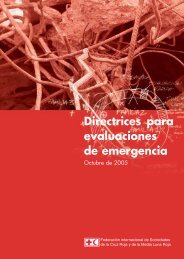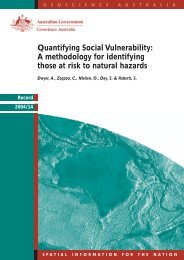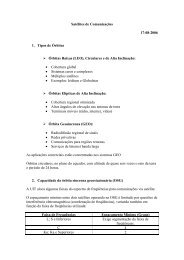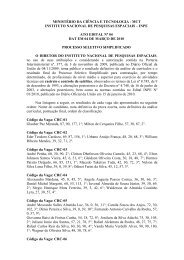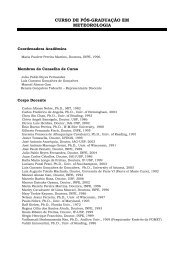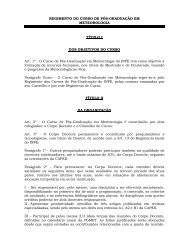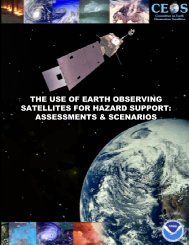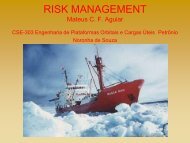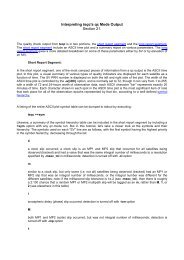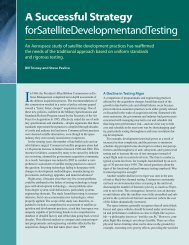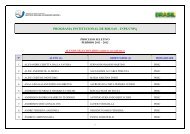Living with Risk. A global review of disaster reduction initiatives
Living with Risk. A global review of disaster reduction initiatives
Living with Risk. A global review of disaster reduction initiatives
You also want an ePaper? Increase the reach of your titles
YUMPU automatically turns print PDFs into web optimized ePapers that Google loves.
4<br />
<strong>Living</strong> <strong>with</strong> <strong>Risk</strong>: A <strong>global</strong> <strong>review</strong> <strong>of</strong> <strong>disaster</strong> <strong>reduction</strong> <strong>initiatives</strong><br />
Information Center at the University <strong>of</strong> Nebraska<br />
in Lincoln, U.S.A. (www.ngdc.noaa.gov and<br />
enso.unl.edu/agmet/ centers.htm), which also<br />
<strong>of</strong>fers a series <strong>of</strong> regional training seminars on<br />
drought management and planning techniques<br />
aimed at training scientists and policymakers<br />
worldwide in the science <strong>of</strong> drought management<br />
and preparedness. Another source is the<br />
Oxford Drought Research Institute in the U.K.<br />
Climate Change<br />
An important international initiative has been<br />
proceeding since mid-2001 by an Inter-Commission<br />
Task Team convened under the auspices<br />
<strong>of</strong> the World Meteorological Organization<br />
(WMO), its technical commissions and Member<br />
States to create a series <strong>of</strong> associated<br />
Regional Climate Centers (RCCs) Although<br />
individual centers are not yet established, they<br />
are being planned in order to increase the collaboration<br />
among climatological, meteorological<br />
and hydrological /water resources manage-<br />
ment technical communities and to facilitate<br />
the widespread availability <strong>of</strong> climatic information<br />
pertaining to longer term forecasting.<br />
With the recognized need for more consistent<br />
technical criteria for data generation and<br />
exchange, and broader forms <strong>of</strong> inter-sectoral<br />
information analysis and dissemination particularly<br />
regarding the availability <strong>of</strong> seasonal to<br />
inter-annual forecasts, work is continuing to<br />
define both the potential organizational and<br />
functional responsibilities <strong>of</strong> Regional Climate<br />
Centers.<br />
While this endeavor will necessarily draw<br />
heavily on the already established National<br />
Meteorological and Hydrological Services <strong>of</strong><br />
individual countries, as well as the RSMCs<br />
engaged in providing a variety <strong>of</strong> hazard information<br />
and forecast products, the initiative is a<br />
timely indication <strong>of</strong> institutional moves to<br />
address emerging <strong>global</strong> needs for both technical<br />
and public information about changing<br />
perceptions <strong>of</strong> risk. In recent years the Regional<br />
Climate Outlook Forums have played a key<br />
Other RSMCs specialize in tropical cyclone forecasting and the dissemination <strong>of</strong> related information services.<br />
These include:<br />
• Nadi, Fiji Tropical Cyclone Centre covering the South-west Pacific Region, (www.met.gov.fj/advisories);<br />
• Honolulu Hurricane Center for the Central North Pacific Ocean,<br />
(www.nws.noaa.gov/pr/hnl/cphc/pages/cphc.shtml);<br />
• New Delhi Tropical Cyclone Centre, for the eastern Indian Ocean,<br />
(www.imd.ernet.in/services/cyclone/<br />
cyclone-warning-services);<br />
• Miami Hurricane Center for the Atlantic Ocean and Caribbean Sea, (www.nhc.noaa.gov/products),;<br />
• Tokyo Typhoon Centre for the western Pacific and Asian Region<br />
(ddb.kishou.go.jp/typhoon/cyclone/cyclone);<br />
• La Réunion Tropical Cyclone Centre for the western part <strong>of</strong> the Indian Ocean, (www.meteo.fr/temps/<br />
domtom/La_Reunion/trajGP/data/home_trajGP).<br />
In addition there are Tropical Cyclone Warning Centers that have more specific localized regional responsibilities,<br />
such as those exemplified by the following:<br />
• the Perth Bureau <strong>of</strong> Meteorology coverage for Western Australia, (www.bom.gov.au/weather/wa),<br />
• the Darwin Bureau <strong>of</strong> Meteorology for the waters north <strong>of</strong> Australia,<br />
(www.bom.gov.au/weather/nt/inside/cyclone/cyclone.shtml),<br />
• the Brisbane Bureau <strong>of</strong> Meteorology for coverage <strong>of</strong> the Coral Sea,<br />
(www.bom.gov.au/weather/qld/cyclone),<br />
• the Port Moresby, Papua New Guinea National Weather Service for the Solomon Sea and Gulf <strong>of</strong><br />
Papua, (website under preparation) and<br />
• the Wellington Meteorological Service <strong>of</strong> New Zealand, Ltd. for the Southern Seas etc. (www.metservice.co.nz/forecasts/high_seas.asp)<br />
172



